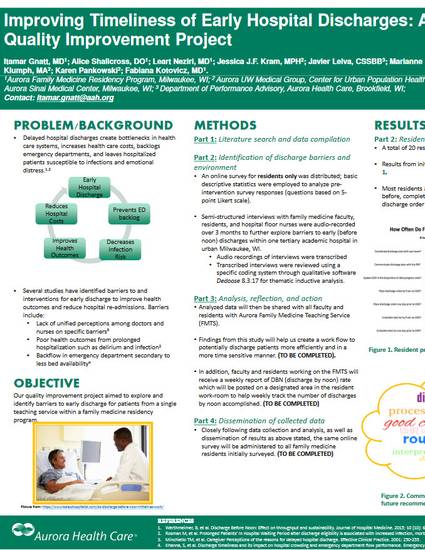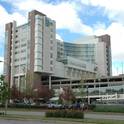
Background: Delayed hospital discharges create bottlenecks in health care systems, increase health care costs, backlog emergency departments, and leave hospitalized patients susceptible to infections and emotional distress. Several studies have identified barriers to and interventions for discharge timeliness in order to decrease the impact of delayed patient discharges.
Purpose: This quality improvement project aimed to explore and identify barriers to early discharge for patients within one hospital teaching service.
Methods: From August 2019 to November 2019, semi-structured interviews with family medicine faculty, residents, and hospital nurses were performed and recorded to further explore barriers and opportunities to early (before noon) discharge within a tertiary academic hospital in urban Milwaukee, Wisconsin. Transcribed interviews were further reviewed using qualitative software Dedoose 8.3.17 for thematic inductive analysis. Additionally, an online survey for residents was distributed and basic descriptive statistics calculated to summarize survey responses.
Results: Through qualitative analyses, 4 themes were identified. Overarching themes included: 1) barriers to early discharges (eg, Supplement www.aah.org/jpcrr 365 suboptimal communication [components cited 87 times during interviews], safety concerns [cited 4 times], language/transportation barriers [cited 60 times], specialty clearance [cited 20 times]); 2) suggestions for improvement (eg, electronic health record tools, examples of good communication, clear expectations, waiting lounge, process standardization); 3) discharge planning process (eg, timely medicine reconciliation and order [cited 17 times], patient discharge expectations [cited 15 times]); and 4) system implications of discharge by noon (eg, workflow improvement, communication improvement).
Conclusion: Our findings highlight the need for standardization of discharge workflow and potentially modifiable early-discharge barriers. Results from this study will be used to implement interventions and educate providers on ways to optimize early hospital discharges.
Gnatt I, Shallcross A, Neziri L, Kram JJF, Leiva J, Klumph M, Pankowski K, Kotovicz F. Improving timeliness of early hospital discharges: A quality improvement project. Poster presented at: Aurora Scientific Day; May 20, 2020; virtual webinar hosted in Milwaukee, WI.

Aurora Family Medicine Residency Program
Aurora UW Medical Group
Center for Urban Population Health
Aurora Sinai Medical Center
Department of Performance Advisory
Aurora Health Care